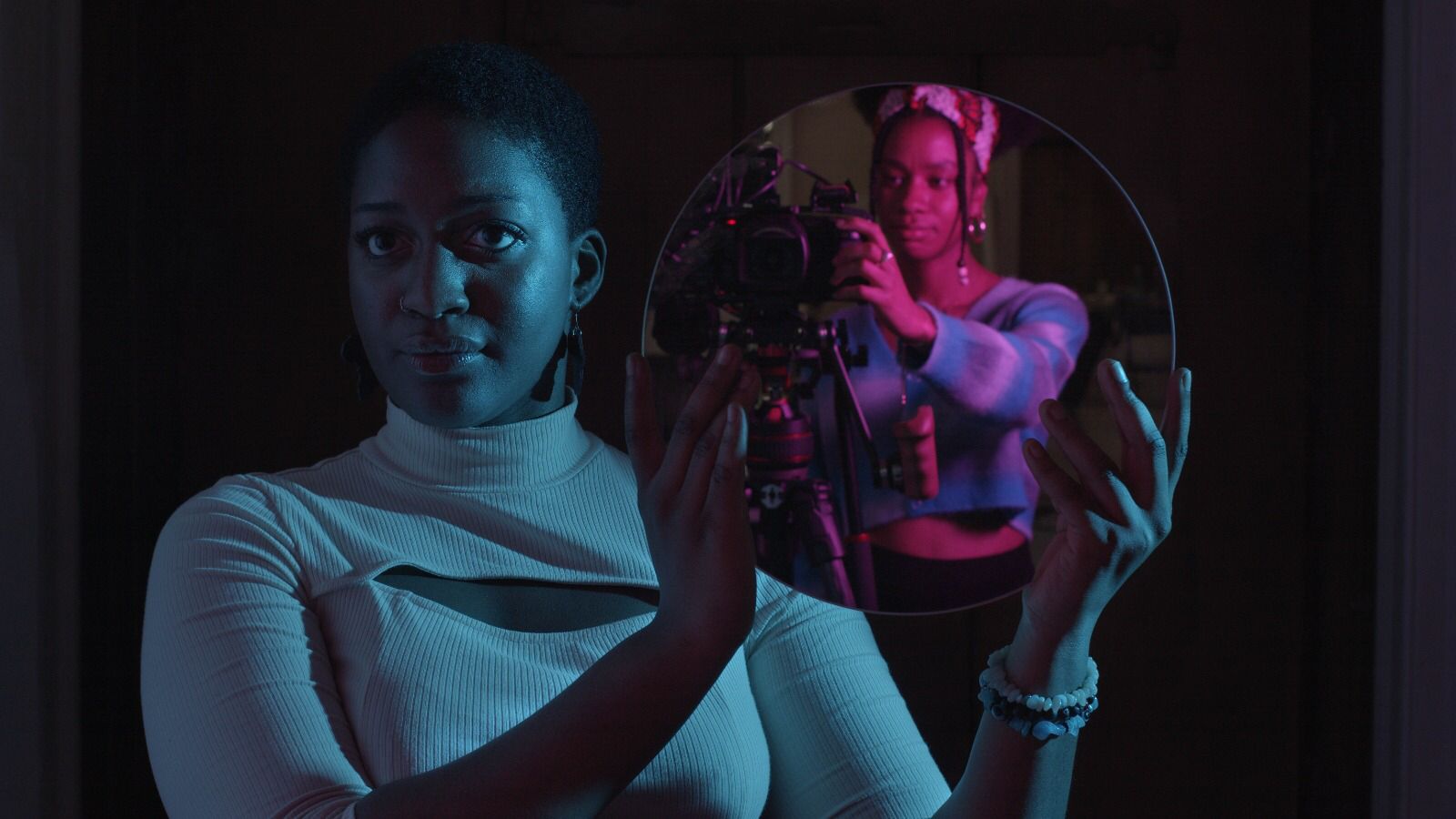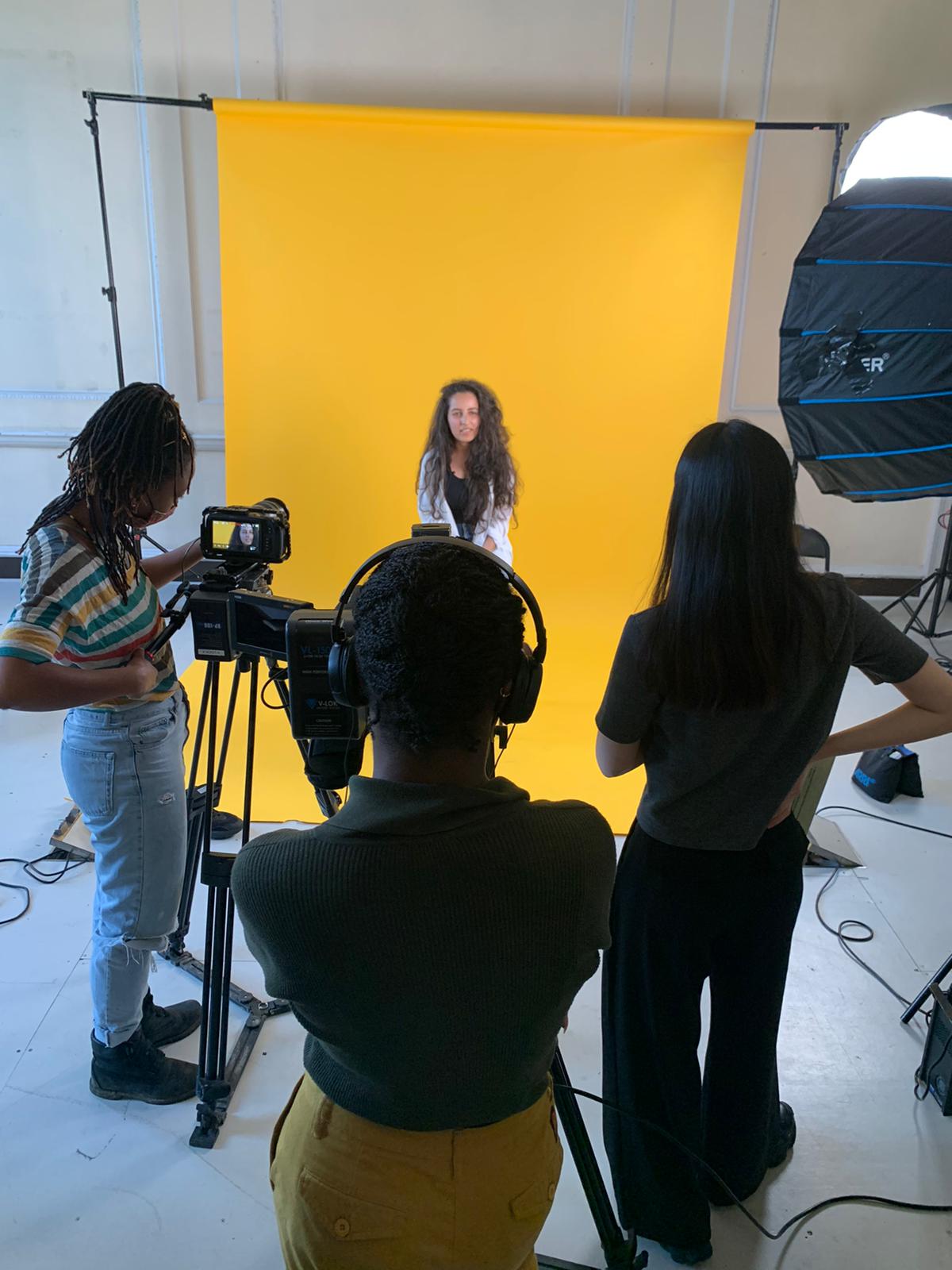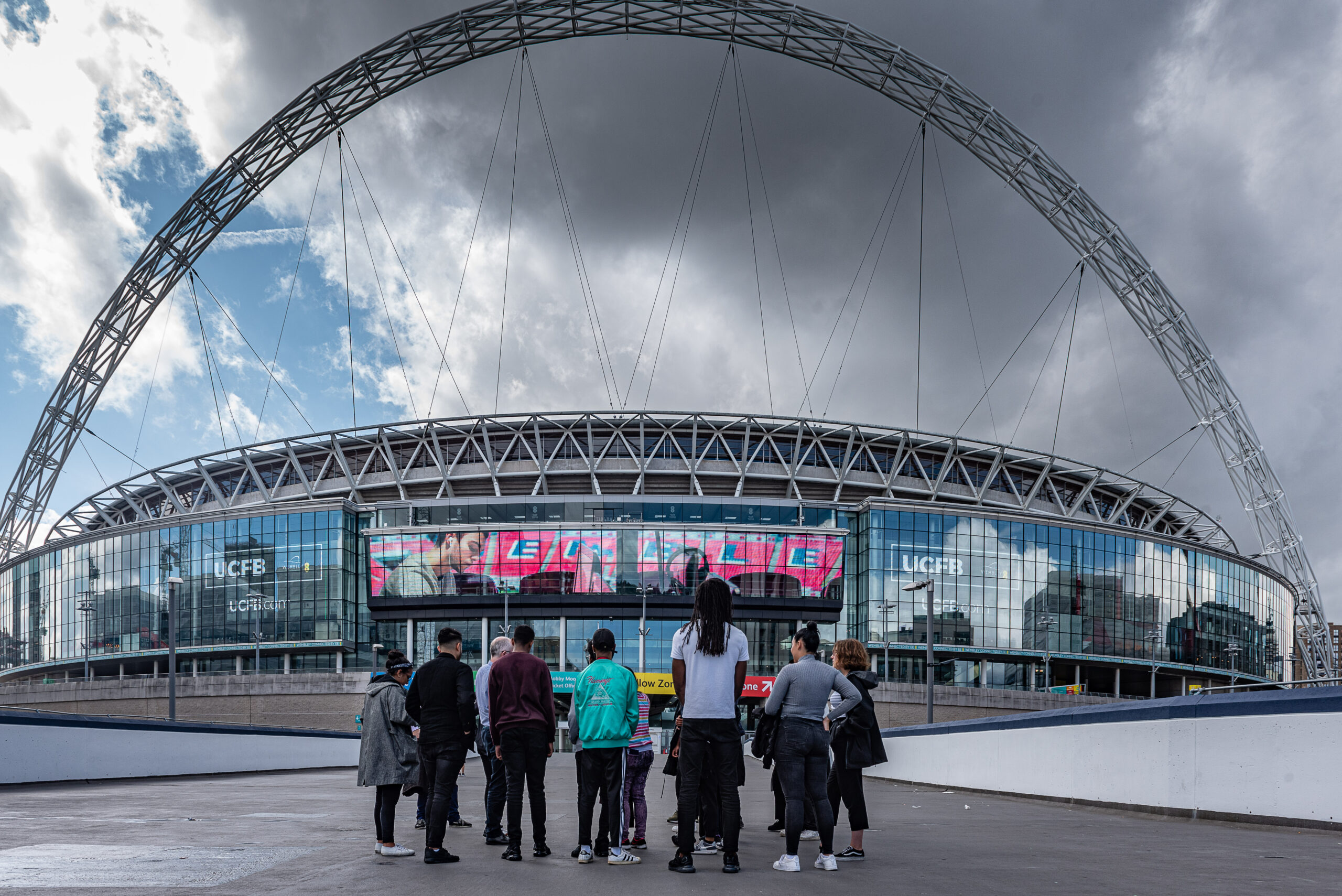
I first met Dhikshana Turakhia Pering when she joined my team as Head of Engagement and Skills at Somerset House, London, in January 2020, just as a pandemic engulfed the world. We sadly only worked together for three months, but in that time we established a brilliant, supportive working relationship and I remain a fervent champion of Dhikshana. I love her dynamic creative leadership, cheeky sense of humour, optimism, enthusiasm, and dogged determination to instigate change for the greater good.

From an early age I was drawn to stories, music, television, and films that fit this bill, maybe it was to escape but it also inspired me and fed into my education and career. "
Dhikshana has recently been appointed as the first Director of Programmes for the National Saturday Club, leading the creative direction of their education programme of national events.
The National Saturday Club enables 13–16-year-olds across the UK with opportunities to develop valuable creative and practical skills, increase their confidence, and introduce them to pathways to further and higher education and rewarding careers.
At Somerset House Dhikshana focused on a new strategy for the team, with a focus on young people’s engagement and skills development, coproduction of new work with their onsite creative community and content development around the cultural programme. During 2020 she led on what a post Covid-19 engagement programme would look like and the organisation’s Anti-Racism Pledge.
Dhikshana’s career has been built in London over 16 years, working in learning and engagement across the Science Museum, London Transport Museum, and Brent 2020 – London Borough of Culture. She has led teams and collaborated with different audiences, but has found her interest lies with young adults, skills development, and coproduction, and exploring the use of digital mediums and public space in a cultural context.
Dhikshana holds two master’s degrees in History and Art History from the University of Aberdeen, Scotland and in Museum and Gallery Education from UCL Institute of Education, London.
She has lectured widely and given talks on master’s courses including at UCL Institute of Education, London, and at national and international conferences, seeking to share and learn from best practice, and actively be part of the change she desires to see.
Dhikshana is an active member and finds great solidarity, solace, and support in the Museum Detox network. Dhikshana was an elected Trustee of the Museums Association since 2016, actively working on sector-wide workforce developments and co-led and launched their Learning & Engagement Manifesto. In 2022 Dhikshana was appointed to the board of Clore Leadership.

So many ways to explore this question but I’m going to start with joy. If I feel joy personally then all else follows well. It starts with schmaltz, from the rom coms, coming of age themes, the montage style flash forwards, the dazzling poppy bright colours, the list could go on. From an early age I was drawn to stories, music, television, and films that fit this bill, maybe it was to escape but it also inspired me and fed into my education and career. As I grew older, I was still drawn to this genre, but it became apparent that it was not representing me or my life and that is the shift I have seen in the last few years. So right now, I have just watched season 3 of Never Have I Ever, listened to lots of music produced by Jack Antonoff and reading Brown Girls by Daphne Palasi Andreades. If I could choose somebody to write and direct a rom com of my life it would be directed by Mindy Kaling and Parminder Nagra would play me!
What are you working on?
A moment of change that is about to bring the calm I am looking for, according to my recent Tarot Card reading. I have just finished nearly 3 years of being the Head of Engagement & Skills at Somerset House. My time at Somerset House has been wild and joyful (sometimes) all in one, and I am proud of what we have achieved in the Engagement & Skills team and wider across Somerset House Trust responding to society and what is happening right now on the ground.
I am super excited to be joining National Saturday Club as their values and practice align to what I deeply believe in, which is that access to the cultural and creative sector for enjoyment and employment should not be directed by who you know or where you grew up. To be able to align my passion and experience, while I learn and grow with the participants, tutors and partners and shape the future of the National Saturday Club programme with the wider team is an amazing opportunity. Also, can I say “Mama, I have made it” a quote from a brilliant young woman I knew called Khadija Saye, who sadly passed in the Grenfell fire with her Mama, but when I got the job, I thought of her and that quote.
What are you core values and drivers that you bring to your work? What do you care about?
In 2017 I had the pleasure to take part in the Clore Leadership Short course. It was a life changing moment in my life, I was sitting on my first board, looking at what my next step may be career wise, and about to have a baby. As part of the course, we had a coaching session and my coach and I decided to write a mission statement to help me focus and navigate a lot of change.
Since then, I have manifested this mission statement several times over. I have updated the language slightly, but overall, it has stayed the same. It guides me day to day even when I don’t realise it and incorporates:
Can you provide an example of how you have commissioned artists recently?
In my time at Somerset House, I have worked with artists in a coproduction model in several ways, a flag and film commission linked to our No Comply exhibition with Rose Nordin for OOMK and artist Seth Pimlott. Both worked with our first cohort of Future Producers to explore the themes and create the design of the flag and the storyboard and content of the final film.
While at Brent 2020 as the Young People’s Producer the young people I worked with led a public space design and policy project called Seen and Heard. The aim of the project was to design the space for use and develop a charter and policy guidelines to advise local authorities across the country on how young people should be consulted on development in their area and be part of the solutions to social issues such a knife crime. Collaborating with partners such as LSE Cities, design collective OOMK and developer Quintain, the young people gained skills, learnt about different sectors, made a physical impact on their community and a policy impact on how young people should be seen all in a creative way.

I have been commissioning artists for coproduction with young people since 2015, this has ranged from exhibitions, digital content, and events. On reflection I can see whether my role was as the producer leading the planning and delivery, or the Head of Department guiding a team to commission artists, my focus is to create the right environment to enable three clear elements come together. The three elements are artist, young people, and institution together, creating exciting content that has representation and social justice at its core. I think of it like a fire tringle you need the oxygen, heat, and fuel, the content is the fire and the team that make it happen the scientists.
I set clear vision and guiding principles, so everyone is on the same page, as well as make sure as team we have collaboratively decided the vibe that we are going for across our programme to make sure there is consistency and clarity for our audiences to know what to expect. But none of this hinders the commissioning process as the content created is free to go on the unexpected journey of the coproduction, but the structures I mentioned give bumpers to slide everyone back on to track for what we are trying to achieve.
Once we have an idea about what the shell of the commission would look like we think about our networks, and wider, and then approach a few different artists to discuss the opportunity with and see if it fits for them. Things can chop and change at this point. After that we decide on who we are going with, get the boring paperwork out the way and work on session plans and timelines collaboratively and then get to the best bit making stuff happen!

I would say reach out, say what idea you have, and what connections you may be able to make with the programme you have seen come out of the institution. Don’t spend ages on a big fancy document or brief, just share some very topline thoughts and then if it connects you may get a follow up meeting. If it doesn’t, don’t take it badly, it may just not work right now but you’re on their radar for sure!
A lot of institutions programme ahead of time (like 20 years!) so they may not be able to ever think how they can work with you there and then but learning and engagement teams have more flex. So maybe consider looking at ways you can connect with a team dreaming up and delivering exciting content for audiences visiting and to bring in new audiences.
Institutions can hold the process and practicalities for you (that boring paperwork) so the creative vison and engagement needed with the young people or community you’re engaging with can be focused on. Utilise the producer or manager you are working with to support in holding and advising on what their role can be so you can focus on the longer-term creative journey.
If entering a commission process that is a coproduction be ready to not have the final say or even know the outcome the ‘fire triangle’ model allows a collaboration that is uncharted, and the journey is as important as the final piece of work.
What risks have you taken in the past that did not go well but you learnt the most from?
A few – I started small and they have got bigger! I say to anyone I work with take a risk, make a mistake as that’s the only way we and things change and move.
In one job I thought I could change a database setting myself and ended up inviting a years’ worth of schools to sessions when we already were fully booked. I owned up with lots of apologies, and then my boss concluded that we did need to change the database, so I led on it!
Launching a brand-new programme in the middle of a pandemic (I thought we were coming out the other side, optimism on my part was high!) meant we could not set the programme up as we wanted. This resulted in a lot of online fatigue, things being paused which led to difficult conversations on all sides. After some evaluation and mediation, a clear way to move forward was presented and whilst still not perfect, there are some exciting next steps for this programme strand, and we would not have got there if we had not risked launching it in the first place.
The biggest risk recently well in the last few years that’s standing up for myself and making my voice heard. Not really a risk, right? We should just be doing that. Well one time I did it ahead of starting at Somerset House and it backfired. It led to me being ignored and belittled in front of peers and partners. It hurt a lot. I knew I could leave, which I did, but what I learnt from it was that while it was hard, and it didn’t change anything in the bigger picture, it did for me personally.
It showed me my voice should matter, but it should mater to me that I am speaking my truth and putting it out there. Since then, I have done it again and this time it was heard and changed has happened.
What would you like to change in the arts?
The duplication of programmes that are all trying to do the same thing. Some of that is down to lack of strategy in local authorities about what is being delivered in an area, some of that is down to arm’s length bodies asking for more programmes rather than joining up existing ones to have a strategic impact and finally it is funders that want new and improved programmes to secure more funding rather than seeing success and allowing funding to grow and create a strategic impact of existing programmes.
So, what would I like to see change is how we bring this all together, map it out and create a bedrock of sharing and signposting to great programmes and resources around the work of learning and engagement.
Can you tell I am dyslexic and like process and clarity? I also just like making sure no one must start from scratch!
What helpful resources would you recommend to artists?
Below is a list of organisations that will hopefully help artists investigate organisations and bodies that are key to the work of the sector.
Resources to help navigate and deliver:
Museums Association is a membership organisation that campaigns for socially engaged museums and a representative workforce
OF/BY/FOR ALL provides tools, community, accountability, and coaching on radical inclusion
Creative People Places is a funding programme which focuses on parts of the country where involvement in creativity and culture is significantly below the national average
Paul Hamlyn Foundation is one of the largest independent grant-making foundations in the UK, supporting social change
Durham University; Creativity Commission Report and Recommendations is a joint research collaboration between Durham University and Arts Council England, set up to look at the role creativity and creative thinking should play in the education of young people
Gem enables learning across museum, heritage, and cultural settings
Engage are the leading charity for promoting engagement and participation in the visual arts
Examples of organisations doing the work:
Arts Emergency mentoring charity and support network for young people to enable them to flourish in higher education and the cultural industries.
Take Apart make great art with communities
Somerset House is home to the UK’s largest creative community working across art, technology, business, and social enterprise
National Museum Wales is charity comprising of seven national museums and one collections centre
Horniman Museum brings together art, nature, and its myriad collections
Glasgow Womens Library is dedicated to women’s lives, histories, and achievements
Museum of Homelessness exhibitions, events and research tackling homelessness and inequality run by people with experience of homelessness
Pitt Rivers Museum houses more than 500,000 objects, photographs, and manuscripts from all over the world
Company Three is a theatre company led by the ideas of their seventy-five members aged 11-19
Resolve Collective is design collective combining architecture, engineering, technology, and art to address social challenges
Ferarts is an artist-led collective platforming emerging socially – engaged creatives from diverse communities
Mindspray unites creative leaders to establish sustainable links between community, careers, and wellbeing
Culture& opens up the arts and heritage sectors through workforce initiatives and public programmes
Roundhouse provides thousands of 11–25-year-olds the chance to develop their skills and confidence through creativity in music, media, or the performing arts
Blaze Arts is a youth led, arts charity born in Lancashire
What advice do you have for people who want a career in the arts?
Don’t decide what your full career plan is. The arts, like the rest of the world are changing fast and the job you may do one day doesn’t even exist yet. The last three jobs I had were not a thing when I started my career in 2006.
Money is important. Work out what it is you need to live your life well and see negotiation of a fee or salary as a place to explore not just more money, but flexibility in how your work, where you work, annual leave and support in the form of mentoring or coaching for example. These things have value too and may enable you to live and work in a happier and more successful way.
My checklist of unlocking your power is…
Email dpering@museumoflondon.org.uk, follow Dhikshana on Instagram @d.t.pering and visit London Museum